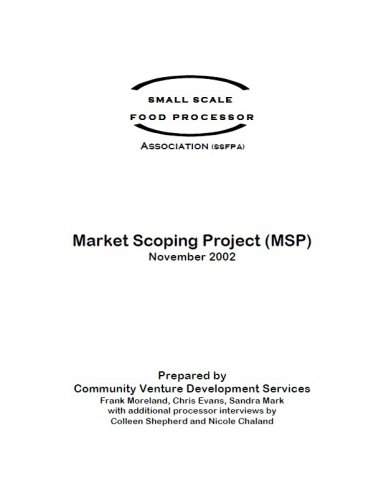Major changes are happening in the structure of the economy of British Columbia. Many communities are facing radical shifts as traditional resource-based activities are in decline. In a climate of change it is axiomatic that new ideas begin to flourish as people struggle to find new ways to sustain their personal and community life. The emergence of the Small Scale Food Processor Association (SSFPA) parallels the launch of several other Agri-Food and community based organizations that have dedicated themselves to rebuilding their local economies on a more sustainable foundation.
This rise of interest is calling on communities and organizations to discover and invent new and innovative strategies that will enshrine small-scale local efforts but do this in such a fashion to ensure living wages and sustainable, flexible capacity to respond to the market. The question in the past has been ‘how can we grow big enough to survive and flourish?’ The question now is, ‘how can we grow smart enough to be able to be able to stay small, economically viable and remain local? This report is underpinned by questions of scale—what is the ‘right scale’ that will allow local entrepreneurs to meet their economic and social goals? The small-scale food processor must decide if they want to produce commercial volumes of their product to achieve a living wage, or if they want to have a hobby that produces spare change.
Download the Executive Summary here
Download the Full Report here
The work of the SSFPA is taking place in a climate of increasing market demand for specialty and organic food. This vibrant market is currently being filled mainly by growers and processors from outside British Columbia. The major question that this study seeks to answer is ‘How can this market be opened to BC producers and processors?’ And ‘what do small-scale producers and processors have to do to prepare themselves to meet this market in a strategic way?’
BC has geographical attributes that lend itself well to a comprehensive small-scale approach to Agri-Food-focused community economic development. This challenge is an opportunity as “less that 5% of BC land is arable…interspersed with pockets of exceptionally productive land benefiting from favourable growing conditions for many commodities…[these factors have protected the preponderance of family farms and–] 95% are still family-owned.” However, the pressure of land-use competition has raised land prices to the point that family farms are under threat for intensive development. Prices of produce and competitive factors from products grown in other countries have further eroded the economic viability of the small farm holding.
There is a critical need for new strategies that can save the family farm and encourage urban agriculture and other Agri-Food strategies. This challenge is being approached by farmers who are experimenting with new crops and products. As well, a huge interest in adding value to farm produce is in evidence. A recent study showed that 67% of the producers contacted were considering a value-added activity to increase their economic viability.2 However, since small- scale processors face formidable barriers, this may not be an easy answer. Can the value-add strategy become an effective one for ensuring the sustainability of our agricultural heritage? How can adding value through processing be accomplished in the most effective manner?
In this atmosphere, intelligence from the market- place can point to opportunities for local producers and processors to ‘right scale’ their business plans and to enter into new and powerful collaborative arrangements that can collectivize efforts to overcome barriers related to smallness of scale.
This report attempts to point to some of these opportunities and to bring forward concepts and models to stimulate discussion for all stakeholders concerned with the health of the Agri-Food sector in BC.
Table of Contents
- Acknowledgements
- Executive Summary
- Introduction
- Data and Analysis
- Literature Review Summary
- Processor Interviews
- Broker/Distributor/Retail Interview results
- Models and Options for Sector Development
- Conclusions
- Summary of Recommendations
- Apprendix A – Annotated Bibliography
- Appendix B – Processor Questions
- Appendix C – Contact information for the Respondants to the Interview
- Appendix E – Annotated Website resource Bibliography
- Food Safety for Growers and Processors
Source





